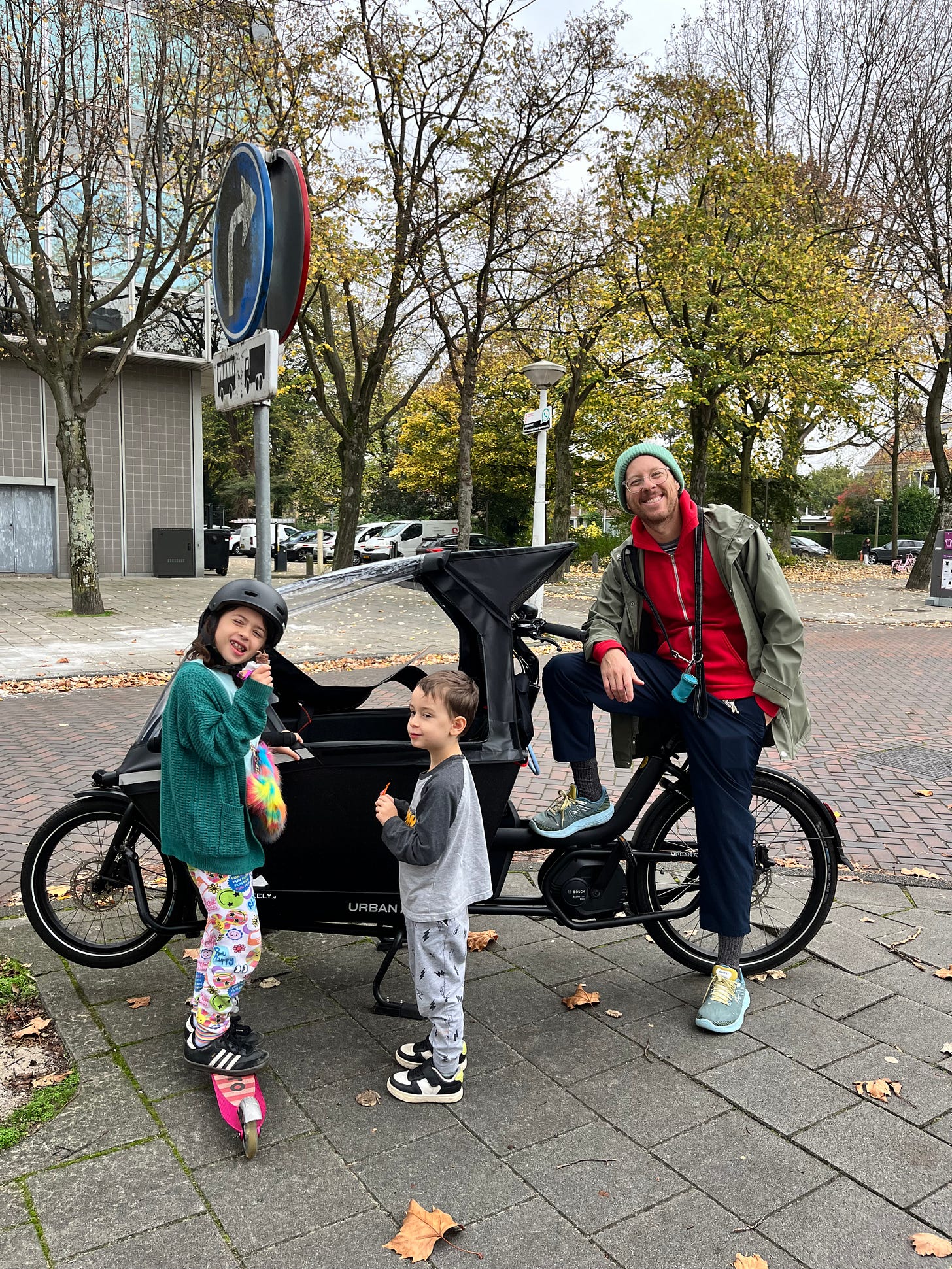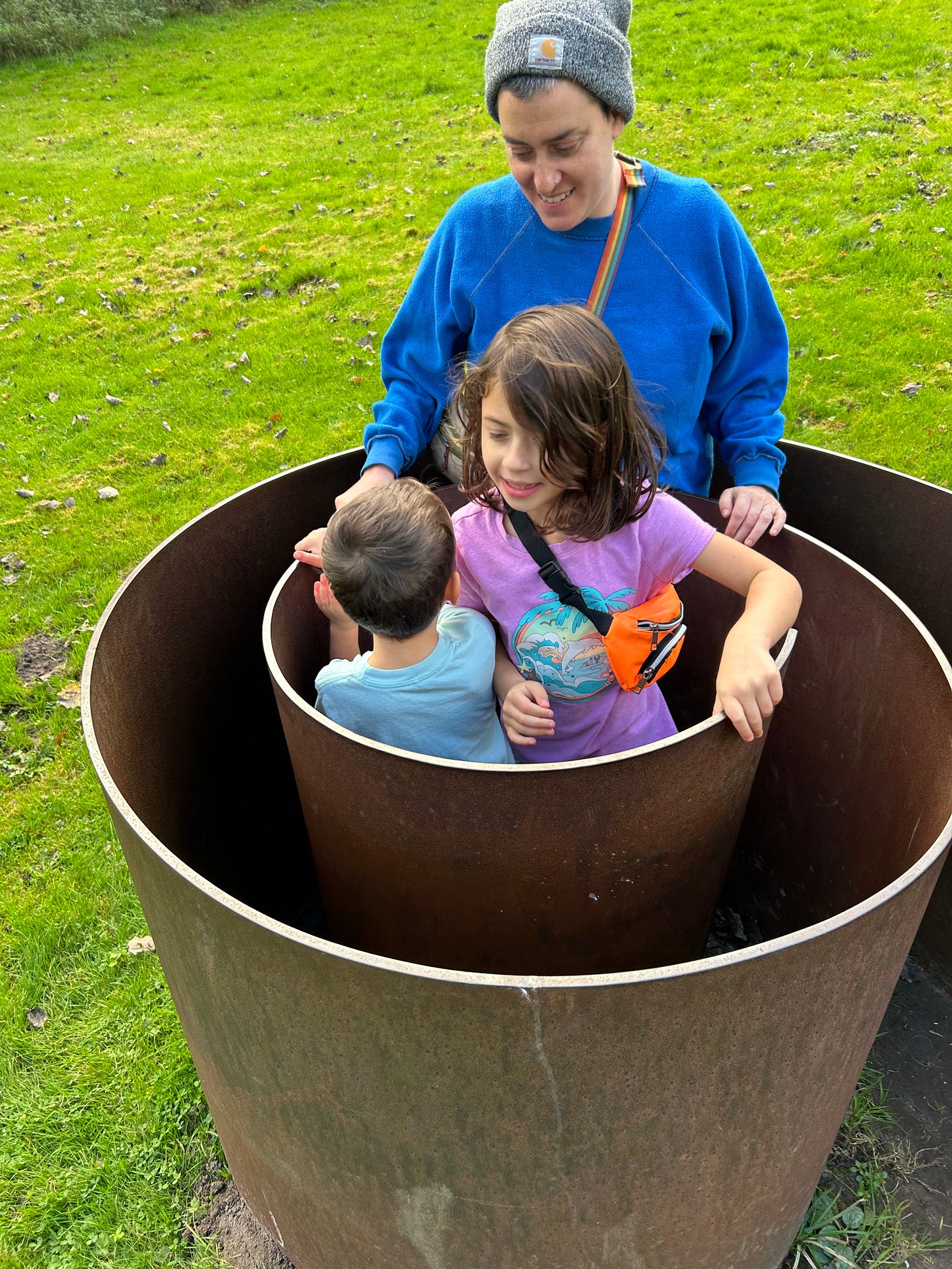Dad Talks #12: Zak Rosen
In conversation with the co-host of Slate's popular parenting podcast
A few weeks back, old pal and regular reader of this here newsletter tipped me that one of the hosts of Slate’s popular parenting podcast, Care and Feeding, was not only a reader of BADIHAF but also referenced it in a recent episode.
So I did what any self-serving TWENTY-FIRST CENTURY CONTENT CREATOR would do and reached out to Zak Rosen to exploit his interest in what I’m doing.
Lucky for me, Zak happily obliged. And I’m thrilled because he’s part of the same circle that I’m trying to foster. That is, a growing group of men who are normalizing the conversations about and around fatherhood.
Zak recently moved with his wife and their kids to Amsterdam, to realize a dream that Emily and I share—spending some time living abroad with our family before our kids are old enough to resent such a drastic move. At least, that’s what Em and I say. Zak’s reasons might have been a bit different. I guess you’ll just have to read and find out.
You recently moved internationally with your family. What has that experience been like? What was the hardest thing about it? What went unexpectedly smooth?
Yes! We moved to Amsterdam in August, 2024. We’ll be here for a total of one year. The big idea was to embark on a family adventure before our kids got old enough (they’re 7 and 4) to resent our unilateral decision and to find a place with excellent public transit and cycling infrastructure so we wouldn’t need to drive much. It took a few years of dreaming and scheming to land here. We chose Amsterdam because they have a public health institute where my wife is pursuing a masters degree. Thankfully, I can work as a freelance podcast maker anywhere.
The hardest part was managing the front-end logistical labor back home in Detroit to make the sabbatical a reality. Where would the kids go to school? How could we afford rent in an expensive-ass city like Amsterdam? How could my wife convince her employer to pay for her tuition and who would cover for her in her absence? Who’s gonna sublet our house in Detroit? What kind of work visa am I eligible for? What do we do with our cars in Detroit? Once we secured answers to the majority of these questions, the reality of us actually picking up and temporarily moving out of Detroit set in.
It’s been really special so far. Luckily, we landed in August when the Amsterdam weather was primo. Sunny and warm but not hot. Had we arrived in their long, grey, dreary winter I honestly think our perception of the city would be totally different.
What about the day-to-day process of living overseas? I know I have my ideas (numerous!) but I'm curious about yours: what does Europe have figured out about kids and parenting that we don't here in the States?
We bought the equivalent of a bougie family van the second day we arrived.
This cargo e-bike is the nicest thing we’ve ever bought. I know it’s entirely cliche to sing the praises of Dutch cycling culture but goodness gracious, the hype is real. Coming from Detroit, the literal Motor City, it’s been nothing short of transformational to travel everywhere by bike. I think I’ve been in a car less than 5 times since we arrived. Amnywhere is Amsterdam is no more than a 25-minute ride from our house and usually much less. The kids have never complained of being bored on the bike (something they constantly fuss about inside our cars in Detroit). If it’s raining, we bike. If it’s freezing, we bike. If we’re tired, we bike. At night we bike. It’s shifted my day-to-day reality in such a profound way.
The Dutch spend a lot of time outside their homes. On the weekend, as long as it’s not pouring, people are walking, biking, reading, schmoozing, drinking and smoking in one of the many large, majestic public parks or cafes. Kids are playing soccer (né football), riding their bikes or scooters and scaling playgrounds. The city has these places called “nature playgrounds” which are charmingly shambolic adventure playscapes for kids to explore. Some even have a little shop where staff give the kids hammers and nails and saws to fuck around with! And these parks are usually connected to cozy cafes that serve beer and coffee and sandwiches and ice cream. The Dutch have their parks dialed in! Oh, and neighborhood petting zoos are a thing here too.
Dutch adults spend a lot of time in cafes and bars, which I expected, but I didn't know until we moved here that a big part of social interaction comes in the form of classes and workshops. Most people are enrolled in at least one evening, adult activity here. I had wanted to take an improv class since college but never mustered up the courage. One I realized how entrenched class/workshop/club culture is here, I signed up. Now I go to improv class every Wednesday evening at 7 PM. It's humiliating and fun!
You host a popular parenting podcast. What has been the biggest thing you've taken away from that experience? How has the podcast informed your job as a dad?
To have a consistent space to talk openly about my parenting triumphs and fails and feelings from the previous week is such a gift. Aside from my wife and kids and mom, I talk to my co-hosts (Jamilah Lemieux in LA, Lucy Lopez in Miami, and Elizabeth Newcamp in Tokyo) more regularly and more intimately than anyone else in my life. The show incentivizes me to document the preciousness of each stage and not take it for granted.
Given that your finger is on the pulse courtesy of the podcast, how do you see/feel fatherhood evolving? What is our generation doing that perhaps dads before us were not?
I don’t have anything profound to add here. It’s probably obvious to anyone reading this newsletter, but we’re so much more involved in the inner lives of our kids than our parents or grandparents’ generation. Like, can you imagine your dad or your dad’s dad knowing the words to the generational equivalent of “We Don’t Talk About Bruno”? Every dad in my orbit knows that song.
What kind of father was your dad? What about his parenting have you adopted into your own approach? What have you consciously tried to avoid?
He was there. He came to all my games, plays, events. He coached my baseball teams. He took me to see seminal films (Hoop Dreams, Searching for Bobbly Fisher, No Country for Old Men). He told me loved me. He hugged me and kissed me and cried giving a speech at my bar mitzvah and wedding.
But he was born in 1952. His dad wasn’t around and he and his siblings raised themselves in many ways since their mom worked constantly to make a working class income. My dad didn’t have the privilege of therapy to unpack his pain and mishegas and I felt the ramifications of that. I’m following in his footsteps as a physically present dad and am working to build on that legacy to be emotionally present as well. He wasn’t a misogynist but he certainly wasn’t a feminist either. We didn't talk about consent or sex or depression or "big feelings." All that stuff is pretty standard in our house now.



